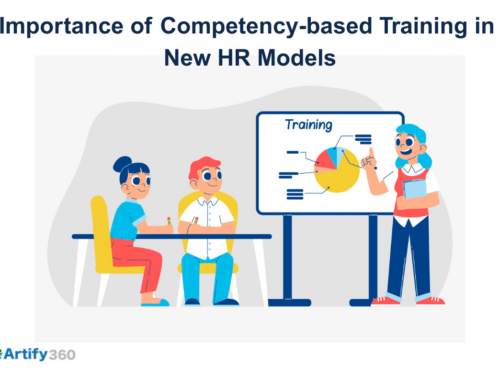The Human Resources (HR) domain is the most wanted part of an organization dealing with all employee-related and operational topics. HR best practices are relevant to achieve a proper fit within the organization that matches all sides of the business. Ensuring HR best practices are in place with strategic support is a challenging task.
We will take a look at some of the tips and techniques to adopt HR best practices for your organization in the recruitment domain. Let’s see how the Artify 360 HR Software system can add value to this particular objective.
All About HR Best Practices for Recruitment
One fact about HR best practices is that they are not the same at all times. For optimum performance and usage, they undergo consistent upgrades. Each aspect of an organization’s operations segment should be separated, analyzed, and implemented with different HR best practices. The approach varies by custom requirements.
What does HR best practice mean? Is it mandatory to implement in your organization? Will it add sufficient value to the company? You may have numerous questions regarding the topic.
Some of the key parameters that deserve essential application of HR best practices include talent management, employee engagement, digital transformation, performance assessment, work culture and environment, etc. While devising a formula in this category, you should be mindful of aligning the business goals with HR strategies.
An intuitive approach mixed with a digital system is the ideal way to proceed in the HR best practice session. Intangible values play a splendid role in generating the best atmosphere in the operations arm of a company. HR best practices can pull this off without too much effort, as the natural sync will be visible and effective.
Rather than discussing HR best practices in detail, we will share the essential tips that you should implement to avail of the optimum measures. We will cover this in an upcoming segment with a focus on HR best practices for the Middle East region.
Will HR Best Practices Vary by Geography?
Before proceeding to the tips for HR best practices for countries in the Middle East, you have to know whether it makes a difference compared to other countries or areas. The simple answer is yes. To elaborate on this, we will look at some examples.
- Consider a scenario where leave management is to be considered. Most Middle-East nations observe public holidays on Fridays. But in most other countries, this will be a proper working day. While developing an HR calendar for the coming fiscal year, this difference is going to be huge over 12 months. HR best practices for the Middle East concerning leave and attendance management should be considered per proven case studies.
- A key module to note is the training and development of human capital resources in an organization. HR policies should be framed to promote the best practices in this category for the Middle East region.
- The mission, vision, and value statements of companies in the Middle East will depend on the specific region and its compliance procedures. HR best practices must follow suit to align with the solid standards in existence.
The list can go on, but you get the drift. HR best practices vary by region, country, and sometimes even the organization in question. You have to keep your system open to upgrade the HR tasks respectively.
Special Tips to Adopt Exclusive HR Best Practices
- Sustainability is crucial in creating a work environment brimming with possibilities that encourage employee engagement and performance boost. Try inclusion, diversity, green initiatives, etc.
- Plan for the long term. Quick fixes might work but will not empower your organization’s motives for a longer period.
- Focus more on maintaining your resources than onboarding new ones. Attention and energy should go to the management of existing operations.
- HR activities in a firm should be mindful and supportive to the benefit of the organization’s members.
- Do not hide your weakness from components that matter within the organization. It is better to engage in strategies like SWOT analysis than to run away from addressing those limitations.
- Stay updated on upgrades related to HR best practices in the niche. It could come from other HR bodies or representative entities managing the domain.
- Personalized care is relevant for employees in current job scenarios. Ensure that everyone is regarded with genuine assistance from the HR department and authoritative systems assigned to the cause.
- The implementation of HR management software differs for small business units, mid-level firms, and large enterprises. Pick the one that best matches your demands.
- Grievance redressals and feedback contributions from employees must be taken into account. Encourage your employees to voice their concerns and opinions for the betterment of the organization.
- Adoption of technology and innovation is significant for raising the bar on your organization’s performance. Apply the implementation of technology to HR activities first. Follow it up with other sectors of the company following the injection of HR best practices.
- Invest in your employees with dedicated efforts. It will help create a positive work culture and cultivate motivation among your staff associates.
- The benefits and rewards/recognition program in the organization should be active. It should be compelling and collaborative, enabling employees to strive towards reaching their full potential.
- A compensation-based system should be in place to support unforeseen situations that could cause pressure on the employees in the organization.
- For new-age HR policies, a democratic model is preferred over the traditional system that focuses entirely on discipline and a work-addicted style.
- Employee engagement should be at its peak. They must feel valued at their workplaces with a sense of belonging. Fill their work environment with space for mutual respect and trust to grow.
There is no definitive guide that makes you fixate on a written HR policy. The strategy is to adapt and upgrade as per the organization’s needs. For assistance in framing HR best practices for your business network, you may receive support from the Society for Human Resource Management (SHRM). Stand firm, but empathize; show resolve, yet compromise; focus on work, still have fun.
Can Artify 360 Software Help Me with Developing HR Best Practices?
In the present era, what differentiates HR activities from other segments of the organization is the integration factor. The HR software system gets connected to other divisions with ease and determines the organization’s route forward. This makes the adoption of HR best practices in recruitment and hiring models a vital constituent for success.
Achieving an optimum level in terms of HR practices is only feasible if all operational modules work in tandem with each other. Artify 360 HR payroll software can assist you with this if you give it a shot. It holds the key to understanding all HR requirements that the firm demands occasionally. Experience the delivery of best HR practices with Artify 360 cloud HR software solutions.






